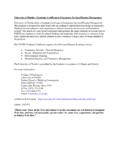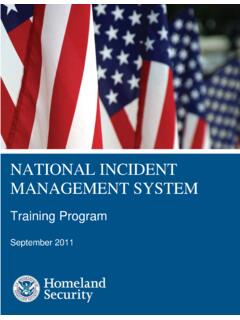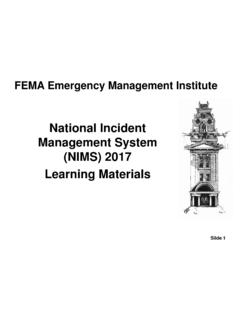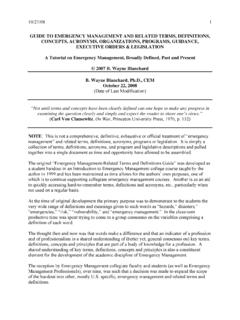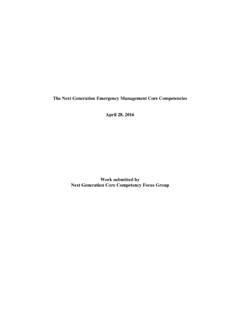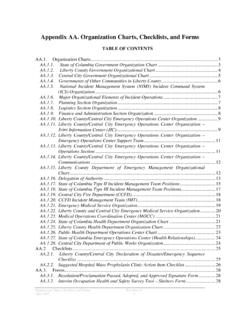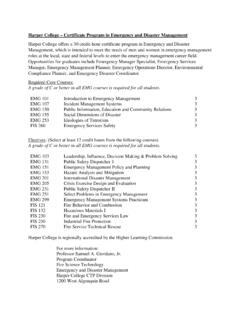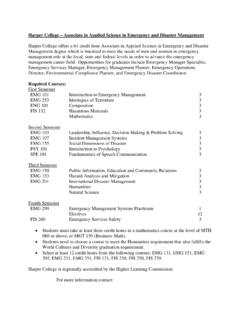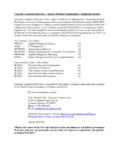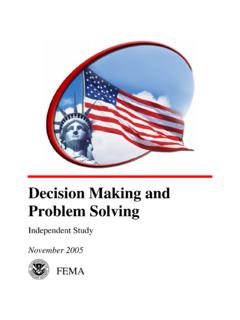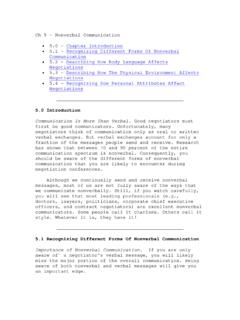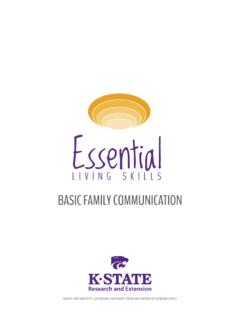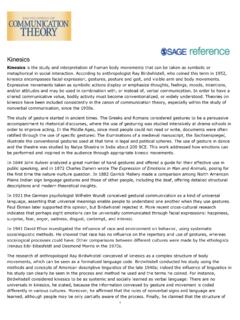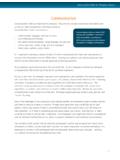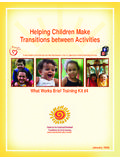Transcription of Effective Communication - FEMA
1 Effective Communication Independent Study December 2005 FEMA TABLE OF CONTENTS Effective Communication Page i Page Course 1 Unit 1: Course Introduction Introduction .. Unit 1 Objectives .. Course Course Overview .. Communicating Activity: If I Could Do It Over Various Groups Respond Differently .. Activity: Personal Learning Goals .. Summary and Transition .. Personal Learning Goals .. Unit 2: Basic Communication Skills Introduction .. Unit 2 Objectives .. Communication Models .. Communication Is a Two-Way Process .. Listening Activity: Listening Self-Assessment .. Hearing vs. Listening .. Active Practice Active Roadblocks to Effective Listening .. Tips for Active Communication Variables .. Activity: Communication Habits .. Summary and Transition .. Knowledge Check .. Unit 3: Communicating in an Emergency Introduction .. Unit 3 Objectives.
2 Characteristics of Emergency Communications .. Types of Communication .. Recent Changes to Emergency Planning Summary and Transition .. For More Information .. Knowledge Check .. TABLE OF CONTENTS Effective Communication Page ii Page Unit 4: Identifying Community-Specific Communication Issues Introduction .. Unit 4 Objectives .. Why Traditional Messages Don t Always Work .. Case Study : Town Meeting .. Activity: Analyzing Community-Specific How To Recognize When a Message Isn t Being Case Study : What Did I Do Wrong? .. Improving Communication With the Community .. Activity: Personal Improvement Goals .. Summary and Transition .. For More Information .. Knowledge Check .. Unit 5: Using Technology as a Communication Tool Introduction .. Technology as a Combining High-Tech and Low-Tech Case Studies in Choosing and Combining Communication Technologies .. Summary and Transition.
3 Knowledge Check .. Unit 6: Effective Oral Communication Introduction .. Unit 6 Objectives .. Matching Communication to Message and Audience .. Activity: Matching the Message .. Oral Communication with Mass Media .. Success Tips for Media Interviews .. Nonverbal Cues .. Nonverbal Clusters .. Case Study : Mixed Signals .. Activity: Nonverbal Behaviors .. Cross-Cultural Meanings of Nonverbals .. Humor .. Effects of Failed Humor .. Activity: Body Language .. Activity: Public Summary and Transition .. For More Information .. Knowledge Check .. TABLE OF CONTENTS Effective Communication Page iii Page Unit 7: Preparing Oral Presentations Introduction .. Unit 7 Objectives .. Speech Anxiety .. What Makes a Good Oral Presentation? .. Types of Presentations .. Case Study : Emergency Messages: Informational or Motivational?.. Case Study : Protecting Animals During Natural Disasters.
4 Summary and Transition .. For More Information .. Knowledge Check .. Unit 8: Course Summary Introduction .. Communication Models .. Communicating in an Emergency .. Community-Specific Communications Issues .. Using Technology as a Communication Tool .. Effective Oral Presentations .. Preparing Oral Next Steps .. Appendix A: Job Aids Course Overview COURSE OVERVIEW Effective Communication Page 1 About This Course Being able to communicate effectively is a necessary and vital part of every emergency manager, planner, and responder s job. This course is designed to improve your Communication skills. It addresses: Basic Communication skills. How to communicate in an emergency. How to identify community-specific Communication issues. Using technology as a Communication tool. Effective oral Communication . How to prepare an oral presentation. FEMA s Independent Study Program FEMA s Independent Study Program is one of the delivery channels that the Emergency Management Institute (EMI) uses to provide training to the general public and specific audiences.
5 This course is part of the Federal Emergency Management Agency s (FEMA s) Independent Study Program. In addition to this course, the Independent Study Program includes courses in radiologicalemergency management, emergency manager, hazardous materials, anddisaster assistance. FEMA s independent study courses are available at no charge and include a final examination. You may test individually or through group training. If you need assistance, or if you have questions contact the Independent Study Program. COURSE OVERVIEW Effective Communication Page 2 FEMA s Independent Study Program FEMA Independent Study Program Administrative Office Emergency Management Institute 16825 South Seton Avenue Emmitsburg, MD 21727 (301) 447-1200 Information about FEMA s Independent Study Program also is available on the Internet at: and click on FEMA Independent Study Final Examination This course includes a Final Examination, which you must complete and submitto FEMA s Independent Study Office for scoring.
6 To obtain credit for taking this course, you must successfully complete (75% correct) this examination regardless of whether you complete this course through self-instruction or through group instruction. You may take the Final Examination as many times as necessary. Course Completion Effective Communication has no prerequisites. It is recommended that you complete this course before taking others in the PDS Series, however. COURSE OVERVIEW Effective Communication Page 3 How To Complete This Course Work through this course at a pace that is comfortable for you. You should resist the temptation to rush through the material, however. Take enough time with each unit to ensure that you have mastered its content before proceeding to the next. Knowledge Checks To help you know when to proceed, each unit is followed by a Knowledge Check that addresses the material contained in the unit. The Knowledge Check asks you to answer questions that apply to what you have learned in the unit.
7 The answers to the Knowledge Check follow each Knowledge Check. When you finish each exercise, check your answers, and review the parts of the text that you do not understand. Do not proceed to the next unit until you are sure that you have mastered the current unit. When you have completed all of the units, complete the final exam online, or use the answer sheet (if provided in your course packet). EMI will score your test and notify you of the results. Begin the Course You may begin the course now. Unit 1: Course Introduction UNIT 1: COURSE INTRODUCTION Effective Communication Page Introduction As an emergency manager, you must be a skilled communicator to achieve your objectives. You are required to convey information to a broad audience that includes public and private sector organizations, the media, disaster victims, and co-responders. Even during non-emergency situations, you will need to rely on strong Communication skills to coordinate with staff and to promote safety awareness.
8 Unit 1 Objectives After completing this unit, you should be able to: Review the main topics that will be covered in this course. Relate the topics to your job and community. Determine a strategy for completing the course successfully. UNIT 1: COURSE INTRODUCTION Effective Communication Page Course Objectives This course is designed to enhance the Communication and interpersonal skills of local emergency managers, planners, and responders. At the conclusion of this course, you should be able to: Describe the basic Communication process. Appreciate the value of empathic listening and Effective feedback. Understand how emergency communications differ from daily Communication and how to be most Effective under emergency circumstances. Assess the multicultural Communication needs of your audience and adjust your verbal and nonverbal message accordingly. Use technology appropriately to enhance Communication success.
9 Tailor your message to your audience. Use nonverbals to enhance your message and accurately read the nonverbal cues of your listener. Prepare an Effective oral presentation. UNIT 1: COURSE INTRODUCTION Effective Communication Page Course Overview This course comprises eight units. Unit 1 offers an overview of the course content. Unit 2 discusses basic Communication skills and styles. Unit 3 examines Communication during emergency situations. Unit 4 addresses community-specific Communication needs and the particular needs, risks, sensitivities, expectations and norms that are relevant to disaster Communication . Unit 5 presents both low- and high-technology Communication tools and discusses how to choose among them. Unit 6 focuses on Effective oral Communication , the role of nonverbal cues, and ways to match your message to your audience. Unit 7 discusses how to develop a successful oral presentation.
10 Unit 8 summarizes the course content. At the conclusion of Unit 8, you will have an opportunity to evaluate the course and your success in meeting your personal course goals. Communicating Effectively During an emergency, it is especially challenging and important to communicate accurate information clearly to the target audience. Disaster victims generally look for someone who can communicate valuable guidance, provide leadership, and lead them in problem solving. When you successfully fill that role, you act to reassure victims that their government and private organizations are working toward community recovery. Finely tuned Communication skills are also important tools during the emergency planning phase when educating the public about preparedness. UNIT 1: COURSE INTRODUCTION Effective Communication Page Communicating Effectively (Continued) It is easy to take communicating for granted because it is a daily activity.
